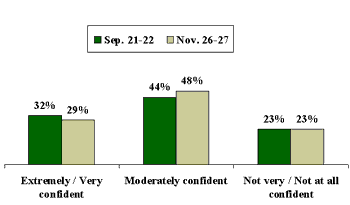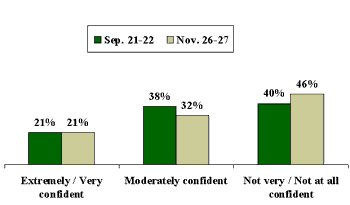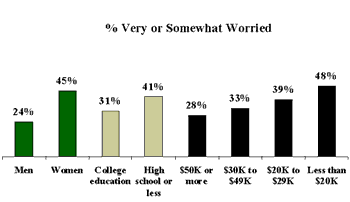GALLUP NEWS SERVICE
PRINCETON, NJ -- For better or worse, the U.S. public seems to be adapting to the new terrorist reality confronting the country. According to a CNN/USA Today/Gallup poll conducted Nov. 26-27, Americans continue to see terrorism as a substantial threat to the nation and consider it unlikely that all terrorists around the globe can be defeated. These attitudes haven't changed since mid-September. Nevertheless, Americans' anxiety about terrorism possibly striking their own lives has diminished greatly over the same period.
Americans' fear of terrorism affecting their own lives started to wane in the first few weeks after the Sept. 11 attacks, but it surged in early October, immediately after the first of the recent spate of anthrax cases was reported (on Oct. 4). Since then, this fear has been dropping steadily and is now nearly as low as it was in a Gallup poll three years ago.
- Just 8% of Americans today say they are "very worried" about terrorism affecting themselves or a family member, down from 23% on Sept. 11.
- A total of 35% of Americans are now either very or somewhat worried about this risk, down from 58% in September.
- Close to two-thirds, 64%, now say they are "not too" or "not at all" worried, similar to the 67% who felt this way in August 1998.
The new poll indicates that this decline in fear is not tied to a corresponding increase in public confidence about homeland security. In fact, the survey shows there has been virtually no change since September in the percentage of Americans who feel confident that the United States is capable of preventing another major act of terrorism on domestic soil. Only 29% express high confidence in this today, including 7% who are "extremely" confident and 22% who are "very" confident. Another 48% are just "moderately" confident while 23% are "not very" or "not at all" confident.
| How confident are you that the United States will be able to prevent major acts of terrorism from occurring in the U.S. in the future? |
 |
Confidence about the chances of defeating all terrorist organizations around the globe has declined slightly since September. Only 21% currently say they are extremely or very confident about defeating all terrorists, the same as in September. Another 32% are moderately confident, down six percentage points since September, and 46% are not very or not at all confident.
| How confident are you that every global terrorist organization will be defeated? |
 |
Americans' characteristic optimism seems intact when they are asked to look at the big picture or further into the future. A majority of Americans, 56%, feel either "extremely" or "very" confident that the U.S. economy will be prosperous in the long term, and an even larger number, 63%, are highly confident that "the American way of life will be preserved." These numbers are statistically unchanged from the mid-September survey.
Fear Highest Among Women, Lower Income Groups
In some ways, Americans' response to terrorism is remarkably similar throughout society. The percentages saying they are very or somewhat worried about terrorism are similar among people of varying ages, races, regions of the country, and across communities of different sizes, ranging from cities to rural areas.
Three areas where substantial differences are seen are gender, income and education; Gallup has noted these differences in the past, but they persist. Nearly twice as many women as men express concern about becoming a victim of terrorism: 45% of women are very or somewhat worried, compared to 24% of men. And, close to half of those in households earning less than $20,000 per year, 48%, report feeling somewhat or very worried, compared to only 28% of those earning $50,000 or more per year. Also, there is a 10-point gap in concern between those with college educations and those who never went beyond high school.
| Fear of Terrorism: by Gender, Education and Income |
 |
| Nov. 26-27, 2001 |
Survey Methods
These results are based on telephone interviews with a randomly selected national sample of 1,025 adults, 18 years and older, conducted Nov. 26-27, 2001. For results based on this sample, one can say with 95 percent confidence that the maximum error attributable to sampling and other random effects is plus or minus 3 percentage points. In addition to sampling error, question wording and practical difficulties in conducting surveys can introduce error or bias into the findings of public opinion polls.
How worried are you that you or someone in your family will become a victim of terrorism -- very worried, somewhat worried, not too worried, or not worried at all?
|
|
|
|
Not |
KNOW A VICTIM (vol.) |
|
||
|
% |
% |
% |
% |
% |
% |
||
|
2001 Nov 26-27 |
8 |
27 |
34 |
30 |
1 |
* |
|
|
2001 Nov 2-4 |
11 |
28 |
34 |
26 |
0 |
1 |
|
|
2001 Oct 19-21 ^ |
13 |
30 |
33 |
23 |
* |
1 |
|
|
2001 Oct 11-14 ^ |
18 |
33 |
35 |
14 |
* |
* |
|
|
2001 Oct 5-6 ^ |
24 |
35 |
27 |
14 |
* |
* |
|
|
2001 Sep 21-22 ^ |
14 |
35 |
32 |
18 |
* |
1 |
|
|
2001 Sep 14-15 ^ |
18 |
33 |
35 |
13 |
* |
1 |
|
|
2001 Sep 11 ^ † |
23 |
35 |
24 |
16 |
1 |
1 |
|
|
Pre-Sept. 11 |
|||||||
|
2000 Apr 7-9 ‡ |
4 |
20 |
41 |
34 |
-- |
1 |
|
|
1998 Aug 20 † ♠ |
10 |
22 |
38 |
29 |
-- |
1 |
|
|
1996 Jul 20-21 † |
13 |
26 |
34 |
27 |
-- |
* |
|
|
1996 Apr 9-10 ♣ |
13 |
22 |
33 |
32 |
-- |
* |
|
|
1995 Apr 21-23 ♣ |
14 |
28 |
33 |
24 |
-- |
1 |
|
|
^ |
WORDING: How worried are you that you or someone in your family will become a victim of a terrorist attack -- very worried, somewhat worried, not too worried, or not worried at all? |
||||||
|
† |
Based on one-night poll of 619 national adults with a margin of error of ±4 pct. pts. |
||||||
|
‡ |
Asked of a half sample |
||||||
|
♠ |
WORDING: How worried are you that someone in your family will become a victim of a terrorist attack similar to the bombing in Oklahoma City? |
||||||
|
♣ |
WORDING: How worried are you that you or someone in your family will become a victim of a terrorist attack similar to the bombing in Oklahoma City? |
||||||
|
* |
Less than 0.5% |
||||||
|
(vol.) Volunteered response |
|||||||
How confident are you that each of the following will happen -- extremely confident, very confident, moderately confident, not very confident, or not confident at all? How about -- [RANDOM ORDER]?
A. The United States will be able to prevent major acts of terrorism from occurring in the U.S. in the future
|
|
|
|
|
Not confident |
|
||
|
2001 Nov 26-27 |
7% |
22 |
48 |
18 |
5 |
* |
|
|
2001 Sep 21-22 |
7% |
25 |
44 |
18 |
5 |
1 |
|
|
* Less than 0.5% |
|||||||
B. Every global terrorist organization will be defeated
|
|
|
|
|
Not confident |
|
|
|
2001 Nov 26-27 |
5% |
16 |
32 |
29 |
17 |
1 |
|
2001 Sep 21-22 |
6% |
15 |
38 |
28 |
12 |
1 |
C. The American way of life will be preserved
|
|
|
|
|
Not confident |
|
||
|
2001 Nov 26-27 |
18% |
45 |
29 |
5 |
2 |
1 |
|
|
2001 Sep 21-22 |
23% |
42 |
28 |
4 |
2 |
1 |
|
D. The U.S. economy will be prosperous in the long-term
|
|
|
|
|
Not confident |
|
||
|
2001 Nov 26-27 |
12% |
44 |
34 |
6 |
3 |
1 |
|
|
2001 Sep 21-22 |
18% |
42 |
31 |
7 |
1 |
1 |
|
SUMMARY OF CONFIDENCE
|
2001 Nov 26-27 |
Extremely confident |
Very confident |
Total confident |
Total not confident |
|
% |
% |
% |
% |
|
|
The American way of life will be preserved |
18 |
45 |
63 |
7 |
|
The U.S. economy will be prosperous in the long-term |
12 |
44 |
56 |
9 |
|
The U.S. will be able to prevent major acts of terrorism from occurring in the U.S. in the future |
7 |
22 |
29 |
23 |
|
Every global terrorist organization will be defeated |
5 |
16 |
21 |
46 |
Do you think the Bush administration has -- [ROTATED: gone too far, been about right, or not gone far enough] -- in restricting people's civil liberties in order to fight terrorism?
|
|
Been |
Not gone far enough |
No |
|
|
2001 Nov 26-27 |
10% |
60 |
26 |
4 |
